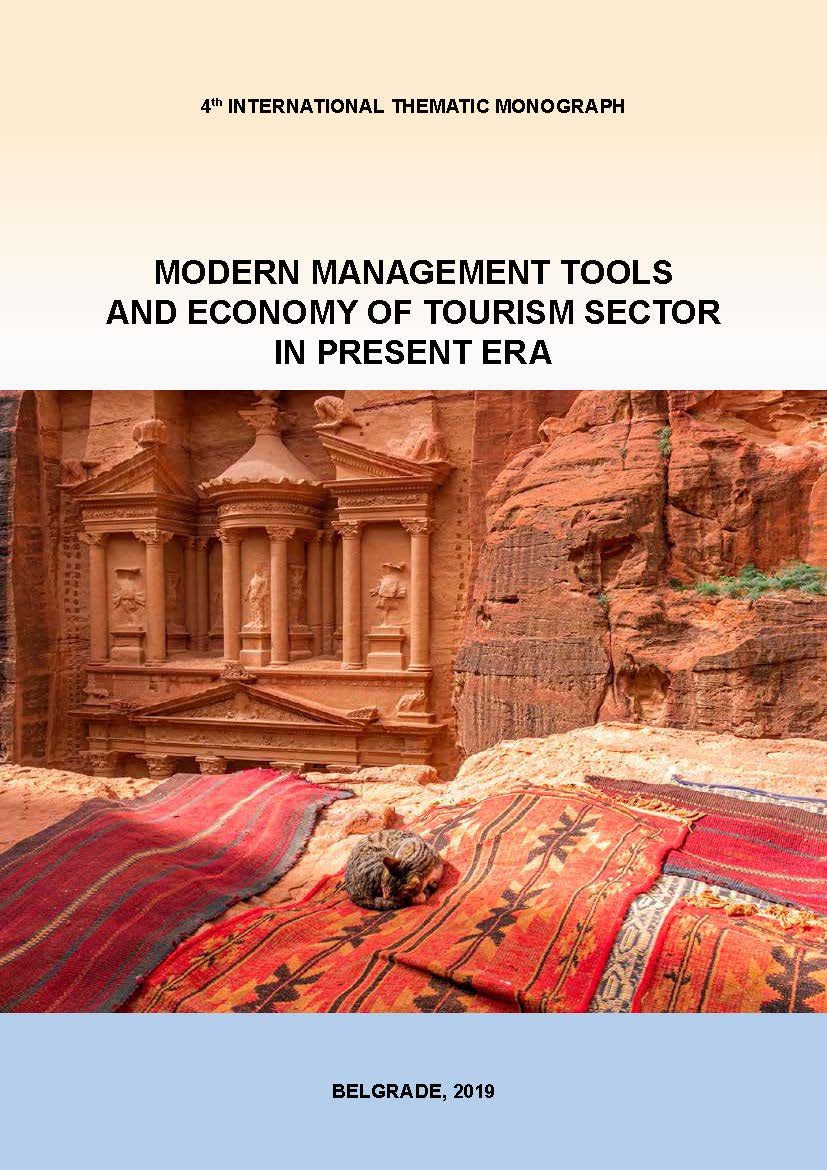|
MANAGING THE RECOGNITION OF BULGARIA AS A SPA AND WELLNESS DESTINATION Milena Stoyanova Konstantin Preslavsky University of Shumen, Department of Geography, Regional Development and Tourism, 115 Universitetska str., Shumen, Bulgaria DOI: https://doi.org/10.31410/tmt.2019.91 4th International Thematic Monograph - Modern Management Tools and Economy of Tourism Sector in Present Era, Belgrade, 2019, Published by: Association of Economists and Managers of the Balkans in cooperation with the Faculty of Tourism and Hospitality, Ohrid, North Macedonia; ISSN 2683-5673, ISBN 978-86-80194-29-5; Editors: Vuk Bevanda, associate professor, Faculty of Social Sciences, Belgrade, Serbia; Snežana Štetić, full time professor, The College of Tourism, Belgrade, Serbia, Printed by: SKRIPTA International, Belgrade
|
|
Abstract: Developing the country image as a tourist destination should be reviewed carefully so the positions on the competitive markets can be developed successfully. The process of organizing, management and monitoring the image of a tourist destination is way more complex compared to that of individual companies of the market. That way the building of a brand of the tourist destination cannot be compared with branding strategies of traditional goods and services. That’s why the managers of Bulgaria as a spa and wellness tourist destination should be aware of the situation inside the country – of the strengths and the weaknesses, as well as of the situation outside, including possible opportunities and threats. The whole strategy for developing the destination and the image strategy should be harmonized with the vision of the government, the local people and of all stakeholders in the first of spa and wellness tourism. The aim in this chapter is to outline some key steps for building a unique image and brand of the destination by using the chosen tools for interaction and methods for developing spa and wellness products in order to achieve an identical distinctive image. Keywords: Bulgaria, Spa and Wellness Destination, Distinctive Image, Planning, Monitoring, Improving. REFERENCES Alexieva, S. & S. Temelkova. (2013). The brand of the tourist destination or a unique offer for the tourist. The new tourist brand “Bulgaria” – perspectives and problems www.ibsedu. bg/media/Conference/2013/_2013_2.pdf Marinov, R. (2010). Ideas for building an image for institutions and countries. Public relations, 4/97. Petrova, A. (1999). Psychology of advertisement. Issuing “Forkom”, S. Popova, D. (2012). The image of Bulgaria and the steady development of tourism. Management and steady development, 1/2012 (32). Robert, D. (1992). Nature of communication processes. In: Communication, complied and edited R. Bobchev. Faculty of journalism and mass communication, S., 98 - 99. Stavrev, I. (2008). Image of the tourist destination – nature and instruments for creation. National economic archive, 1/2008. Temelkova, S. (2013). The choice “Brand Bulgaria” http://ebox.nbu.bg/ssc14/view_lesson. php?id=8 (1.02.2019) Wind, J. (1980). Going to Market: New Twist for Some Old Tricks. Wharton Magazine, 4. V: Doganov, D. (2000). Marketing in Tourism. “Princeps, С. Zhelev, S. (2010). Positioning. Between the desired, the possible and the reality. University Issuing. „Stopanstvo”, S. ADDITIONAL READING Aksu, A. A., Caber, M., & Albayrak, T. (2009). Measurement of the destination evaluation supporting factors and their effects on behavioral intention of visitors: Antalya region of Turkey. Tourism Analysis, 14, 115–125. Baloglu, S. and K. McCleary. (1999a). A Model of Destination Image Formation. Annals of Tourism Research, 26(4), 868-897. Byon, K. K. & Zhang, J. J. (2010). Development of a scale measuring destination image. Marketing Intelligence & Planning, 28(4), 508 – 532. Chon, K. S. (1991). Tourism destination image modification process: Marketing implications. Tourism Management, 12, 68–72. Gallarza, M. G., Gil, I., & Caldero´n, H. (2002). Destination image: Towards a conceptual framework. Annals of Tourism Research, 29(1), 56–78. Gartner, W. C. (1993). Image formation process. Journal of Travel and Tourism Marketing, 2(2/3), 191–215. Hui, T. K., & Wan, T. W. D. (2003). Singapore’s image as a tourist destination. International Journal of Tourism Research, 5, 305–313. Iordanova, E. (2017) Tourism destination image as an antecedent of destination loyalty: The case of Linz, Austria. European Journal of Tourism Research 16, 214-232. Jenkins, O. H. (1999). Understanding and measuring tourist destination images. International Journal of Tourism Research, 1, 1–15. Johann, М. & L. Anastassova (2014). The perception of tourism product quality and tourist satisfaction: the case of polish tourists visiting Bulgaria. European Journal of Tourism Research, 8, 99-114. Leisen, B. (2001). Image segmentation: The case of a tourism destination. Journal of Services Marketing, 15(1), 49–66. Moon, S. K., Kim, M., & Lee, H. J. (2011). The influence of consumer’s event quality perception on destination image. Managing Service Quality, 21(3), 287–303. Nghiêm-Phú, B. (2014). A review of destination image studies from 2008 to 2012. European Journal of Tourism Research, 8, 35-65. Nghiêm-Phú, B. (2018) Correlation between tourists’ perceptions/evaluations of destination attributes and their overall satisfactions: Observations of a meta-analysis. European Journal of Tourism Research, 19, 98-115. Qu, H., Kim, L. H., & Im, H. H. (2011). A model of destination branding: Integrating the concepts of the branding and destination image. Tourism Management, 32(3), 465–476. Stoyanova, M. (2018). Affective image of spa and wellness destination Bulgaria. In V. Bevanda & S. Štetić (Eds.), 3rd International Thematic Monograph: Modern Management Tools and Economy of Tourism Sector in Present Era, (pp. 501-508), Belgrade: https://doi. org/10.31410/tmt.2018.501. Tasci A. D. & Cartner W. (2007). Destination Image and Its Functional Relationships, Journal of Travel Research, 45 (4), 413-425. Zhang, H. Y. Wu & D. Buhalis. (2017). A model of perceived image, memorable tourism experiences and revisit intention. Journal of Destination Marketing & Management. 8, 326-336.
| |||||||
Association of Economists and Managers of the Balkans
- UdEkoM Balkan -
179 Ustanicka St, 11000 Belgrade, Republic of Serbia
E-mail: [email protected]
www.udekom.org.rs
- UdEkoM Balkan -
179 Ustanicka St, 11000 Belgrade, Republic of Serbia
E-mail: [email protected]
www.udekom.org.rs
Tel. +381 62 812 5779
VAT number: 108747027
Registration number.: 28157347
Registration number.: 28157347


